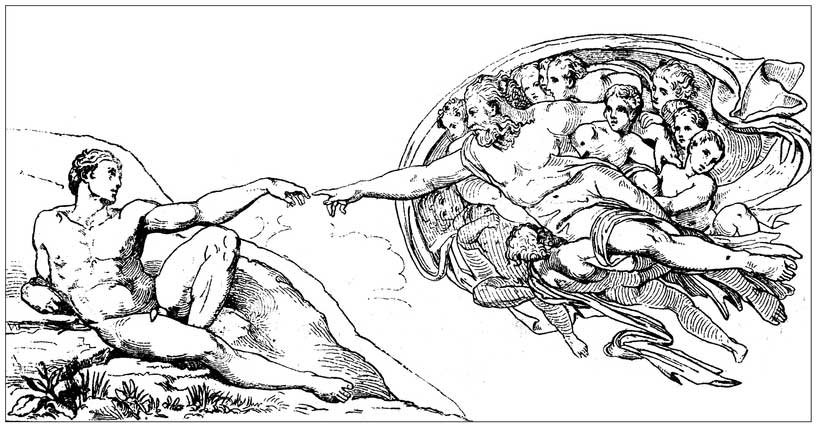Adam, Eve, and the Serpent
Adam, Eve, and the Serpent
by Elaine Pagels
New York: Random House, 1988
189 pp.
reviewed by Leon J. Podles
Scriptural interpretation by the Latin and Greek Fathers of the Church seems far removed from the social and theological controversies of the twentieth century. However, in ecclesiastical circles as in Communist regimes, discussions of the past are often used as a cloak for polemics about modern problems. In the nineteenth century, Catholics and Protestants debated about the nature of the early church in order to demonstrate the continuity of their beliefs with early Christianity. The implicit message was that if Catholic or Protestant beliefs were found in the early church, Catholic or Protestant beliefs were the “true” or “legitimate” form of Christianity.
Elaine Pagels, despite her disclaimer of polemic intent, attempts to demonstrate that the “orthodox” Christianity of the pre-Augustinian church was consistent with feminism, and that (implicitly) the current crop of feminists are the true Christians and their opponents are heretics. This book is another manifestation of the Kulturkampf that is being waged over the central symbols of Christianity. What The Last Temptation of Christ tries to do to the Gospels, Adam, Eve, and the Serpent tries to do to the early church.
Pagels’ explicit thesis is that the variety of theological opinions in the early church about the nature of freedom were reflected in different interpretations given to the story of the Fall. This book is therefore a continuation of the line of inquiry that she took in The Gnostic Gospels. (1979) Her conclusions in Adam, Eve, and the Serpent are:
—the “orthodox” interpretation of the Fall emphasized the freedom of man that continued even after the Fall;
—the Gnostic, “heretical” interpretation of the Fall emphasized the lack of moral freedom of fallen man;
—the church’s “orthodox” doctrine of freedom was a principal cause for the popularity of Christianity. This freedom meant that redeemed man was no longer subject to the tyranny of nature and society. Especially, in virginity women found freedom from the demands of family life;
—Augustine rejected the previous “orthodox” interpretation of human freedom when he said that redeemed man was still unfree. Augustine did this because he read his own sexual struggles into Romans; and
—Augustine’s novel doctrine of original sin became the new orthodoxy because the Church found this doctrine useful in a Christian Empire. A doctrine of man’s freedom and autonomy was useful against a pagan Empire. A doctrine that man was weak, fallible, and unable to govern himself was more useful to an Empire and a Catholic Church that both wanted obedience.
While Pagels does not invent her textual evidence, she does not give her controversial interpretations of the historical material the defence they require. Part of this failure is caused by a lack of thoroughness in her analysis of the history of the doctrine; a part is caused by her unawareness of the feminist implications of her arguments or by her unwillingness to admit that her work has polemic intent (or at least effect).
Leon J. Podles holds a Ph.D. in English from the University of Virginia, has worked as a teacher and a federal investigator, and is president of the Crossland Foundation. He is the author of The Church Impotent (Spence), Sacrilege (Crossland Press), and Losing the Good Portion: Why Men Are Alienated from Christianity (St. Augustine Press). Dr. Podles and his wife have six children and live in Baltimore, Maryland. He is a senior editor of Touchstone.
subscription options
Order
Print/Online Subscription

Get six issues (one year) of Touchstone PLUS full online access including pdf downloads for only $39.95. That's only $3.34 per month!
Order
Online Only
Subscription

Get a one-year full-access subscription to the Touchstone online archives for only $19.95. That's only $1.66 per month!
bulk subscriptions
Order Touchstone subscriptions in bulk and save $10 per sub! Each subscription includes 6 issues of Touchstone plus full online access to touchstonemag.com—including archives, videos, and pdf downloads of recent issues for only $29.95 each! Great for churches or study groups.
Transactions will be processed on a secure server.
more from the online archives
calling all readers
Please Donate
"There are magazines worth reading but few worth saving . . . Touchstone is just such a magazine."
—Alice von Hildebrand
"Here we do not concede one square millimeter of territory to falsehood, folly, contemporary sentimentality, or fashion. We speak the truth, and let God be our judge. . . . Touchstone is the one committedly Christian conservative journal."
—Anthony Esolen, Touchstone senior editor










